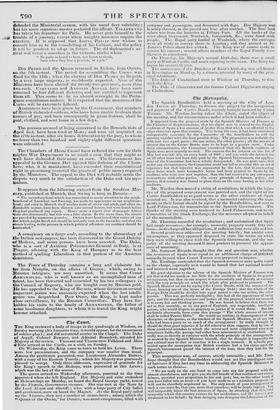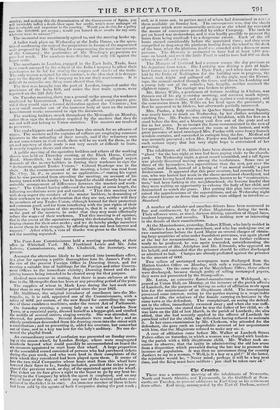Cfbe itirtrapoILI.
The Spanish Bondholders held a meeting at the City of Lon- don Tavern on Thursday, to discuss the project for the recognition and payment of the Cortes Bonds, recently brought forward by Count Toren°. Mr. ‘Veedon having taken the Chair, stated the object of the meeting, and the circumstances under which it had been called— It appeared front the proposal made by the Spanish Minister of Finance to the Chamber of Representatives, that his object was to extend to the English ci editors of Spain a less measure of justice titan that which was afforded to the other claimants upon that country. This being the case, it hail been considered indispensably necessary by the Conanittee of the Bondholders to call the meeting together with the least possible delay. The proposition was to divide the debt into two equal parts—the one active, the other passive; all the arrears of interest due on the Cortes Bonds were to be kept in a passive state. Under these circumstances, the Cotmnittee considered that the British creditors of Spain were most unjustly treated. The amount due for interest on the 1st of Alay last was 10s. on every bond of 100/. ; and yet, while the interest due on all other limits had been duly paid by the Spanish Government, the applica- tions of the Committee had been wholly disregarded. He was quite sure, that under any circumstances, the Committee could not fail to consider this an act of injustice ; but that injustice was augmented by the fact, that in contracting these loans much none favourable terms had been granted to Spain by the creditors who were now met together, than she had received in any subsequent transactions with other patties. On every principle of honour, policy, and justice, that country was bound to place them on the same footing as her other creditors.
Mr. Weedon then moved a string of resolutions, in which the injus- tice of the proposed arrangement was pointed out, and the right of the Cortes Bondholders to as good terms as the other creditors of Spain insisted on. It was also resolved, that a memorial embracing the argu- ments in their favour should be signed by the Bondholders, and sent to Lord Palmerston, for transmission to the Spanish Government. The thanks of the meeting were tendered to Lord Pahnerston, and to the Committee of the Stock Exchange, for the measures adopted in behalf of the memorialists.
Mr. Thornton seconded the resolutions ; and maintained that Spain had ample resources—for example, monastic property worth fifty mil- lions—to discharge all her obligations, if sufficient time were alio xed her.
Several gentlemen addressed the meeting briefly ; but amidst some interruption, as they appeared disposed to state the terms on which they were willing to close with the Spanish Government, and time ma- jority of the meeting deemed it most prudent to preserve the appear- ance of unanimity. Mr. Satnpson Ricardo thought that the real question was, whether the resources of Spain were equal to an additional charge of 200,0001. annually beyond what Count l'oreno was prepared to impose. Mr. Easthope contended that the Spanish resources were quite equal to time charge, especially as it would be found that her national honour and interest went together.
Ills great objection to the scheme of the Spanish Minister of Finance was, not that it did too much or too little for the creditors of Spain in its general arrangement, but that in one respect it was essentially and directly at variance with the very principle on which the whole plan professed to proceed. The Spanish Minister set out by saying (the Cortes Bonds, with the arrears of in- terest, firming one of the items of the Foreign Debt) that the whole of the Foreign Debt should be divided into equal nmieti..s—the one active, the other passive. This was perfectly intelligible; this had all the appearance of being Just; and the manifest clearness and justice of the proposal would recommend It to every fair and thinking person. He was bound to believe that there was not in that assembly, or in any part of England, any respectable, intelligent person, who would dispute its propriety or justice if it rested there. But Mi. mediately afterwards, there came this passage " The whole arrears of interest shall be called Passive Debt." He would say nothing in disparagement of the character, or the genius, or the intellect of the Spanish Minister, or of any one who had been a party to so much of the arrangement : he really thought he should do them great injustice if he did otherwise than suppose, that by one of those accidental mistakes to which the wisest and most enlightened men were sometimes liable, this passage had either been misconceived or overlooked. It really was so directly at variance with the whole principle of the arrangement, as avowed by the Spanish Minister himself, that he thought it impossible for any rational man to abet or sanction it for a single moment. It actually pro- ceeded upon the assumption that British creditors had a less claim upon the Spanish Government quoad the interest of the loan, than they bad for the pn incipal.
This assumption was, of course, utterly untenable ; and Mr. East- hope thought that the Bondholders would not act like intelligent men of business if they lost any time in addressing the Spanish Minister in such terms as these-
" We are ready on the one hand to come into any fair proposal with the utmost cheerfulness, and to give you the full benefit of that readiness and cheer.- fulness, provided your proposition be fair and just ; but, on the other hand, if you have fallen into an error—if you have made to us a mistaken proposal—.it will not be cheerfully acquiesced in. The only result of your arrangement in such a ease must be, that you, more than ourselves, will be deeply injured. Nou will irreparably injure the best interests of Spain, by attacking that delightful sympathy which this country evinces for her tnisfintunes, and the intemest mar awakened in her behalf: by thus bringing into disrepute the Liberalism of the country, and making this the determination of the Government of Spain, you will inevitably iuflict a death- blow upon her credit, which must endanger all that is valuable and important to the country. Would you do this for a paltry emu like 200,000/. per annum ; would you hazard thcae results for any sum, whatever were its amount ?"
The memorial was unanimously agreed to, and the meeting broke up.
A ballot took place on Wednesday at the India House, tn the ques- tion of confirming the vote of the proprietors in favour of the augmented scale proposed by Mr. Weeding for compensating the maritime servants of the Company : the particulars of Mr. Weeding's proposition we gave last week. The numbers were 385 for, and only 137 against the larger scale.
The merchants in London, engaged in the East India Trade, have been numb annoyed by the refusal of the India Company to allow their warehouses to be let for storing the cargoes :led stocks of the trade. The only reason assigned for this conduct, is the idea that it is deroga- tory to the dignity of the Company to let out their warehouses. It is difficult to conceive any thing more absurd than this.
The first teas brought into the port of London, imported under the provisions of the India Bill, and under the free trade system, were reported on the 22d July last. On Tuesday morning, there was a general strike among the workmen employed by Government. They were all offered employment pro- vidud they would sign a formal declaration against the Unionists; but a very small number out of the inuncuse body of men on the various Government works consented to sign the document.
The working builders struck throughout the Metropolis on Monday, rather than sign the declaration required by the masters that they do not and will not belong to Union societies. The masters are resolved to persevere. The coalwhippers and coalbeavers have also struck for an advance of wages. The masters and the captains of colliers are employing common labourers in the unloading of their vessels, and if the refractory inert do not soon return to their work, there will be no work for them, as the art and mystery of their trade is not very occult or difficult to learn. It merely requires thews and sinews.
A public meeting of the operative builders and others of the working classes was held on Thursday evening, at the Black Horse, Curtain Road, Shoreditch, to take into consideration the alleged unjust demands of the master builders in forcing their workmen to sign the " declaration against Trades Unions." Colonel Stanhope was in the chair. At the commencement of the meeting, a letter was read from Clay, M. P., in answer to an application—" stating his regret that he was prevented from attending the meeting, on account of his leaving town with his family ; but he hoped he should shortly hear of an amicable arrangement of differences between the masters and work- men." The Colonel having addressed the meeting at sonic length, the following resolutions were put and carried. " That this meeting view with deep regret the conduct of the master builders, in demanding of their workmen to sign a declaration that they are not, neither will they be, members of any Trades Union, although formed for their protection and common good, and far from interfering with the just rights of their employers. The opinion of this meeting is, that it is only a prelude on the part of the masters, in order that they may more effectually reduce the wages of their workmen. That this meeting is of opinion, that in the event of the operatives signing this declaration, they will be forging chains for their own necks ; and we do hereby pledge ourselves to assist them in their struggle, by affording them our best interest and support." After which, a vote of thanks was given to the Chairman, and the meeting separated.





















 Previous page
Previous page